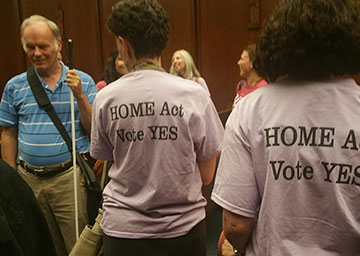The Baltimore County Council has introduced a housing discrimination bill, referred to as the Home Act, which would prohibit landlords from considering a tenant’s source of income.
Because Bill No. 46-16 primarily targets people with Section 8 housing vouchers, for which the governmental subsidizes the rent for eligible low-income, disabled or elderly tenants, reaction has ranged from positive to comments with racist and classism overtones.
In one corner are developers and landlords who believe that government is overstepping its authority and telling them who they can rent their properties to. Also opposed to the bill are people—both African American and white— with a “not in my neighborhood” attitude who believe the bill will bring down property values. Some perceive individuals and families with housing vouchers as people who don’t work or take care of the properties.
Supporters of the issue include those who believe everyone deserves a right to fair housing. They want to break the clusters of concentrated poverty and subsidized housing and see all communities, including those in Catonsville, Cockeysville, Towson and Timonium, accept their share of lower-income tenants.
The average wait time for someone to reach the top of the housing voucher list is nine years, according to Baltimore County. Families with the earliest date and time of application are served first.
Of the more than 6,200 Baltimore County residents who hold vouchers, more than two thirds of them live on the west side in Randallstown and Woodlawn, and the east in Dundalk and Essex.
County Executive Kevin Kamenetz was required to introduce the legislation under terms of a housing discrimination settlement with the U.S. Department of Housing and Urban Development to address unfair housing practices. The purpose is to give people affordable housing in high-opportunity areas.
The bill was introduced at the County Council meeting on July 5 without debate. Advocates, some of them wearing lavender T-shirts that read “Home Act, Vote Yes,” provided comment. Among them was Myesha Allender, a mother whose husband left her after she was paralyzed by a drunk driver, who expressed difficulty in finding a good community with good schools.
Yara Cheikh, a mother whose four children attend Baltimore County Public Schools who is also a landlord of properties in the 21204, 21234 and 21212 zip codes, advocated for the bill.
“The HOME Act helps to prevent concentrations of poverty in our county,” she told council members. “The values of my property are not threatened by the HOME Act. It does not impede my right to determine tenancy based on good credit and good past tenancy. Simply, it keeps landlords unable to discriminate on the basis of renters having the means to pay the rent.”
No one opposed to the bill shared comments at the meeting.
District 4 Councilman Julian Jones says he favors the bill, particularly to give children the opportunity to live in more affluent neighborhoods. “We have to do what we can to help the children to break the cycle of poverty.”
In a response to one community member, Jones described a common practice among some landlords. “Many landlords, especially large apartment complexes, will accept vouchers in Randallstown, Woodlawn, Dundalk and Essex, but will not accept vouchers in other communities, such as Towson, Timonium and White Marsh,” he stated. “In some cases they are the same owners with different policies, based on location and communities.”
It is unclear which council members support and which oppose the bill. Read the bill at http://resources.baltimorecountymd.gov/Documents/CountyCouncil/bills%202016/b04616.pdf. Then contact your council members to express your position on bill before it comes up for a vote on Aug. 1 at 6 p.m. in the council chambers of the historic Courthouse, 400 Washington Ave. in Towson. In a work session on Thursday, July 21, at 2 p.m., the council will discuss the bill and hear public testimony.

